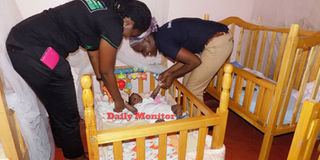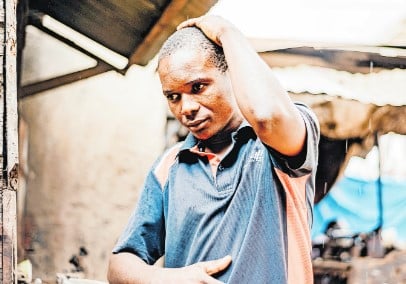Prime
Why there are more walk-away mums

Standard Chartered Bank staff check on a baby at Heart of Child home. Every child at the home has a story attached to them. PHOTO BY Joseph Kato
What you need to know:
When women abandon their children, they break one of society’s taboos of being nurturers. But as baby home owners observe, the trend is rising. But why does this happen?
Seven years ago, a woman who had gone to attend to her vegetable stall in Kasubi market found dogs fighting for something which had been wrapped in a polythene bag. She stood a few metres away fearing to be attacked by the furious dogs.
Still wondering of how she was going to chase away the dogs, which had camped near her stall, she heard a baby crying in the polythene bag, which was being pulled by the dogs. Startled, she looked for a stick and courageously chased away the dogs as the screams got louder.
She opened the polythene bag and found a newly born baby boy wrapped in a cloth. She wailed out loud as she called people to witness what had happened. The police were called and they took the baby to Sanyu Babies Home.
During a visit to the babies home, Christine and Kenneth Nganda’s attention was drawn to the little boy. The caretakers shared his story and how he was rescued, which moved the Ngandas who made up their minds to adopt him.
The little boy spent several months in hospital receiving medical care. The couple christened him Joshua believing that one day he will be a liberator like the biblical Joshua, who led the Israelites to the Promised Land.
Fast forward, Joshua is now seven-years-old. This experience encouraged the Ngandas to start Heart of a Child Uganda in Namakwa village, Nakisunga Sub-county, Mukono District. The centre treats and reunites abandoned children with their parents.
Recently when journalists and staff of Standard Chartered Bank visited the centre, which is home to more than 30 underprivileged children, Nganda said they receive at least two babies every week.
“We are always called by the police or community leaders to pick abandoned children. Most of the children are picked in places such as Matugga, Ndeeba, Bwaise and Kawempe,” says Ms Nganda.

Some of the children at Heart of Child with their new toys.
Why the numbers are soaring
Citing an example of Jeremiah who looks like a one-year-old yet he is eight, Nganda says as a result of domestic violence, many children are forced to run away from their homes.
It is alleged that Jeremiah’s father, an army officer, used to beat him up every day. His mother had also run away over similar abuse. Thankfully, Jeremiah was rescued but his father is tussling it out in court on torture charges.
“Financial predicaments and wars have also largely contributed to child dumping in the country,” Ms Nganda says as she shared the story of Gift Simon who was abandoned in the home by a Burundian refugee.
Simon’s father, who is a cattle keeper, took the baby to the cenrtre and told them he had no capacity to look after the baby. “The baby was in a critical condition. We thought he would not make it. We took the baby for medical checkup where he was diagnosed with cerebral malaria. We are pleased he is positively responding to treatment,” Nganda says.
Baby Solomon was rescued from Bwaise in July after being locked up in a room for nearly a month. One of the residents peeped in the house and saw him lying helpless and alerted authorities.
“It was very amazing to find the baby alive. His condition was alarming. We took him to hospital where he spent a few days. I am pleased because he has improved,” Lillian Mukisa one of the nannies says.
On the whole, Ms Nganda outlines factors such as domestic violence, teenage pregnancies, and men abandoning women as aggravating reasons for child abandonment.
Rehabilitation
Mukisa stresses that taking care of dumped children requires patience, commitment and compassion.
She says the work is demanding and requires self-sacrifice if the children are to make it. Ms Nganda says their main objective is to treat underprivileged children and afterwards reunite them with their parents. For the five years the home has been in existence, more than 120 children have gone through their doors.
Of these, 17 have failed to trace their parents while a host of others were rejected by their parents.
Challenges
Asked why some parents reject their children, Ms Nganda says some children are rejected due to health conditions such as epilepsy, cerebral malaria and tumours.
“We recently lost baby Vivian to meningitis. She was brought when the illness was in advanced stages. We did what we could to save her life but God took her,” Nganda says.
To keep baby Vivian’s memory, the Ngandas have named the home’s clinic after her.
Kenneth Nganda says they do not have a stable source of income but they are determined to change the lives of the children. Israel Arinaitwe, the head of retail banking, Standard Chartered Bank said they chose to visit the home because they wanted to give back to the community. They also donated commodities such as sugar, clothes, and play toys.
In the spotlight
On October 4, 2014, the Guardian reported that in 2009 there were 69 adoptions from Uganda to the US, but the figure went up to 276 in 2013. The same year, the Netherlands suspended all international adoptions from Uganda, saying it wanted more clarity on the circumstances in which biological parents were giving up their children.
In Feb 2013, a report by Maria Nagawa the Masaka district probation officer indicated at least three children were being abandoned in greater Masaka region every day.
These children were aged four months and nine years. She explained that the children were abandoned in the night on the streets and tree shades.
Aggravating factors
Other factors causing child dumping, according to Stella Ayo Odongo the executive director of Uganda Child Rights NGO Forum include lack of sexuality and reproductive education, unchecked anger by parents, incest, vulnerability, deprivation of resources as well as cultural practices.
Odongo says incest has done a lot to increase cases of child dumping in the country. “Girls are defiled and raped by their close relatives. As a result they opt to throw away the babies other than raising children who would always be described as a curse to the society,” she says.
She adds that some parents do not want to discuss sexual matters with their children because their children are still young which leaves them at risk.
“When a parent does not discuss such issues with their child, they do not get skills to deal with the opposite sex,” Odongo says.
Impunity has also done much to harm the society according to Odongo. Some defilement files get lost at the police station and court. “There instances where the police entices parents to drop cases of rape and defilement in exchange for money,” she says.
Way forward
Nganda calls upon the government to do massive sensitization on the ills of early involvement in sexual activities. He also urges the government to extend financial assistance to baby homes and monitor them saying unscrupulous people have set up baby homes for selfish interests.
Odongo agitates for the abolition of negative cultural practices. “We urged legislators to enact a law with strong penalties to defilers and rapists.
Parents should also try to keep their anger in check, especially when their teenage daughters conceive. They should comfort the children instead of chasing them away from home,” stresses Odongo.
Patrick Onyango, the Kampala Metropolitan Police Spokesperson rubbishes claims of police mishandling files.
He urges the public to reduce the vice of child dumping through reporting cases of defilement, rape and abandoned babies to police.
Of course, every single case is different and there are few generalizations to be made.
The good news is that being raised by strangers does not condemn a child to a disadvantaged life.




